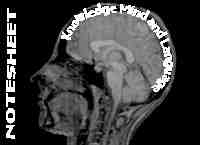
'Consciousness is a brain process'
A brain event/event in consciousness: one thing seen from two points of view - inside and outside -?
U.T. PLACE: IS CONSCIOUSNESS A BRAIN PROCESS?
There are some mental items for which it is difficult to think of a plausible dispositional analysis.
His thesis: that there is nothing logically confused in thinking that these residual mental items may turn out to be processes in the brain.
He is not trying to show either
that statements about sensations are to be understood as statements about brain
processes;
or
that statements about sensations (eg) are reducible to, or analysable into,
statements about brain processes.
His claim is rather that 'consciousness is a brain process' is a reasonable scientific hypothesis.
To show his thesis does not hinge on the meaning of terms he distinguishes an 'is' of definition and an 'is' of composition.
Here is the 'is' of definition:
A square is an equilateral triangle
Red is a colour
And here the 'is' of composition:
His table is an old packing case
Her hat is a bundle of straw held together with string.
A parallel: 'a cloud is a mass of particles in suspension
Limitation: You see what a cloud is by going closer and closer to it, magnifying it. You don't get at the composition of consciousness by subjecting it to ever more detailed scrutiny.
Another parallel: 'Lightning is a motion of electric charges'
THE PHENOMENOLOGICAL FALLACY
Scientists (as distinct from philosophers) are lead into dualism (and so into rejecting the identity hypothesis) by the 'phenomenological fallacy', which is that what we see when we look at a bird (say) is an image of the bird generated internally (as part of the 'phenomenal field', which corresponds to the actual bird. Actually we see the bird.
VP